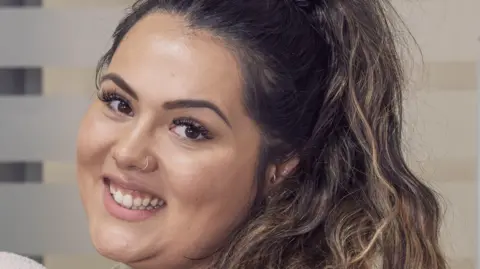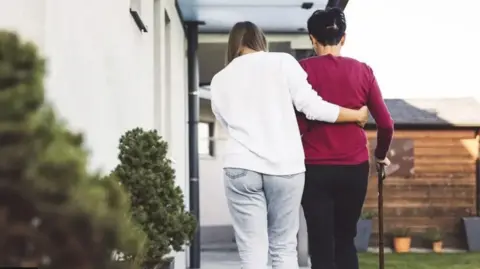Unpaid carer felt 'lonely and isolated' in teens
 BBC
BBCA 29-year-old unpaid carer who felt "lonely and isolated" while growing up said other young carers should be given more of a voice.
Ella McKenzie from St Neots, Cambridgeshire, was in her teens when she began caring for her mother and brother.
Events are taking place across the UK on Thursday to mark Carers Rights Day, which is aimed at helping carers find out about the help and support on offer.
Helen Walker, the chief executive of Carers UK, a national charity, said: "As the value of care provided by unpaid carers continues to grow at an incredible rate, we need to ensure they get the recognition and help they deserve."
The Department for Education, which leads on young carers, said it was spending £2.9bn on pupil premium funding to provide extra help for them.
A spokesperson said: "We want to break down barriers to opportunity for all children, and particularly young carers who face additional barriers, to make sure they have the support they need for the best life chances."
There were 1,825 young carers living in Cambridgeshire and Peterborough when the last census took place in 2021.
That includes anyone under the age of 18 who cares for another person, outside of doing paid or voluntary work.
Cambridgeshire and Peterborough is home to 68,480 carers across all age groups, with more than two-thirds of people caring for 35 hours a week or more.
'I still struggled'
Miss McKenzie welcomed plans to highlight carers' rights, saying: "We need to shout about this from the rooftop.
"I don't think enough carers know about their rights."
Miss McKenzie began caring in her late teens and said it was not always easy asking for help.
"I still struggled with tutors who didn't quite get it, and were pulling me up because I was late or because my brain wasn't switched on all the time," she said.
Miss McKenzie said making friends was "really quite hard", adding: "I felt very lonely and isolated."
She said authority figures "could be better" at identifying young carers and not labelling them as the child who is always late or does not hand in their homework.
"Schools have a big part to play in identifying young carers, but also GPs," she said.
Miss McKenzie now works for the charity Caring Together, helping to plan respite activities for children and young people who care.
"I'm always like, 'Yep, I still care for my Mum', and they say, 'Oh do you?', and they really relate to you."
 Getty Images
Getty ImagesCambridgeshire County Council and Peterborough City Council have introduced strategies to improve how they identify and support carers, including under-18s.
Peterborough City Council is holding workshops this and next week to discuss the results of a survey it recently held for unpaid carers and organisations that work with them.
Shabina Qayyum, cabinet member for adults and health at the city council, said: "We want to improve our level of support for carers in Peterborough.
"We understand the vital role they play in keeping residents independent at home for longer and how demanding this can be."
Cambridgeshire County Council has also highlighted young carers in its strategy that runs until 2026.
The document cited research showing young carers were more likely to try smoking and drugs, get lower GCSE grades and be bullied in school.
A spokesperson said the authority was "committed to supporting young carers".
They said: "We're working to enhance recognition and support for young carers across schools, social care, and health services."
Follow East of England news on X, Instagram and Facebook: BBC Beds, Herts & Bucks, BBC Cambridgeshire, BBC Essex, BBC Norfolk, BBC Northamptonshire or BBC Suffolk.
